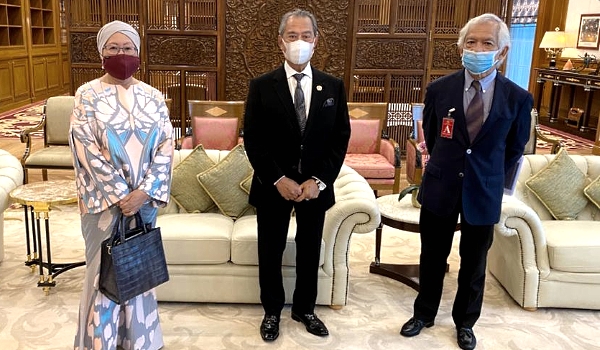
The Health and Sciences COVID-19 Advisory Group of Experts (EAG) would like to thank the Prime Minister for his meeting on 21 April 2021.
We wholeheartedly support the Prime Minister's decision to no longer enforce blanket movement control orders (MCO) as announced on 17 April 2021.
However, the alarming number of positive cases, which are over 1,000% higher than the number of cases reported this time last year, prompts refined mitigation efforts for preventing a fourth wave of COVID-19 in Malaysia.
These mitigation efforts should center on targeted MCO with comprehensive digital find, test, trace, isolation and support (FTTIS).
Our urgent recommendations to the Prime Minister included the following:
1. Implement highly targeted MCO moving forward
All MCO areas must fully employ digitized FTTIS (i.e., the key element for mitigating COVID-19 according to the World Health Organization), which includes the proposed targeted mass testing strategy below.
Highly targeted MCO will minimize economic disruption on top of reducing the spread of COVID-19, balancing the well-being of both lives and livelihoods.
State and district health authorities must be empowered to work with external experts and determine clear and transparent thresholds for when an area should be placed under MCO.
The thresholds should be defined according to population density, number of cases, and geo-characteristics of the area, and be communicated clearly to the public.
2. Conduct surveillance through targeted testing
Mass targeted testing using antigen rapid test kits (RTK-Ag) must be promptly deployed for comprehensive COVID-19 surveillance.
Current testing guidelines which still require fulfilling persons-under-investigation (PUI) and close contact criteria may result in undetected sporadic cases in the community.
Machine learning and artificial intelligence tools should be better utilized for predictive risk model ling and assessment to identify hotspots and risk areas even before an outbreak occurs.
Evidence from a population-wide rapid antigen testing initiative in Slovakia showed that for COVID-19, alongside other mitigation measures, can decrease prevalence by up to 70%.
3. Strengthen risk communication
COVID-19 messaging should pivot to focus on improving health literacy and transmission risk factors in addition to SOP compliance. For example, the general public should have a better understanding of the risks of indoor dining and socialist in a confined space compared to visiting an outdoor Ramadan bazaar which abides by strict SOPs.
A greater understanding of the science behind COVID-19 measures will boost public trust and offset some of the pandemic fatigue which has set in, thus improving SOP compliance in the long run.
4. Boost vaccine rollout while combating vaccine hesitancy
'Pop-up' vaccine registration and information centers can be established in high traffic public areas such as Ramadan bazaars, shopping malls and office buildings, in collaboration with non-government organization.
These 'pop-ups' can also double as rapid testing centers.
Additionally, national community engagement programs for encouraging vaccine registration and combating hesitancy among vulnerable and marginalize populations such as the elderly, Orang Asli, migrants and the digitally illiterate must be urgently expanded.
All of government needs to be aligned on vaccine communications to encourage registration and combat hesitancy.
After more than a year living with COVID-19, the government should prioritize mitigating spread of the virus as it is no longer realistic to try and get infection rates down to zero.
Therefore, all resources must be focused on enhancing the implementation of targeted MCOs.
While the Ministry of Health (MOH) has shown leadership in managing COVID-19, the pandemic is a marathon requiring the contribution of experts including those outside MOH and citizens from all corners of the country for a real whole-of-society effort.
The EAG is currently in discussion with MOH on how to best operationalize the above recommendations and align them with the substantial work that has already been done by the Ministry.
Health and Sciences COVID-19 Advisory Group of Experts
1. Tan Sri Dato' Dr Abu Bakar Suleiman, Chairman
2. Professor Dr Rosmawati Mohamed, Academy of Medicine of Malaysia
3. Dr Mary Cardosa, Malaysian Medical Association
4. Dato' Dr Fadzilah Kamaludin, Malaysian Public Health Physicians' Association
5. Datuk Dr Kuljit Singh , Association of Private Hospitals of Malaysia
6. Datuk Dr Christopher Lee, Infectious Disease Physician
ADVERTISEMENT
ADVERTISEMENT


































